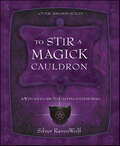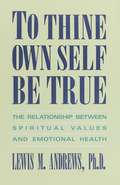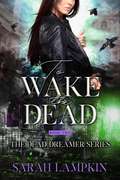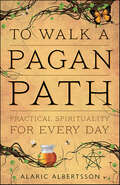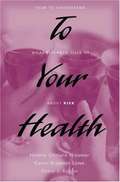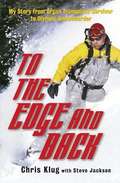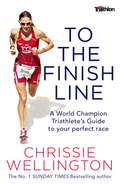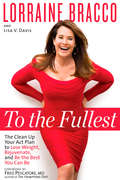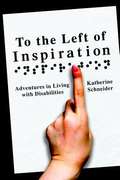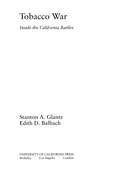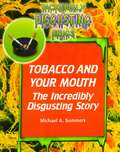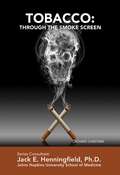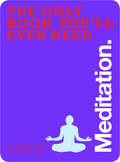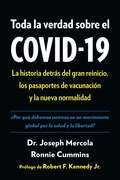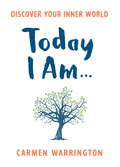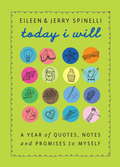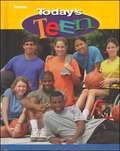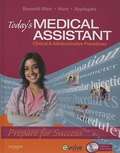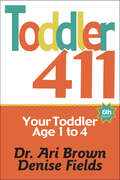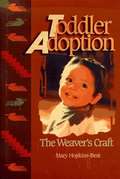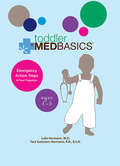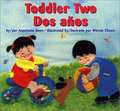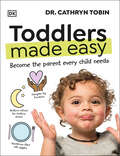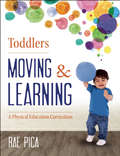- Table View
- List View
To Stir a Magick Cauldron: A Witch's Guide to Casting and Conjuring
by Silver RavenWolfA comprehensive guide to the essentials of Witchcraft, now revised and updated.Cast. Conjure. Stir it up. Call on assistance of the five winds, cast a circle of stars, enlist the help of the nature spirits in your yard. A Witch’s world is filled with wonder and magick. It’s also filled with the hard work and dedication to learning that are part of living the Craft every day.SilverRavenWolf serves up seasoned guidance to the Craft in To Stir A Magick Cauldron, the second volume in the enormously popular Witchcraft series that also includes To Ride A Silver Broomstick and To Light A Sacred Flame. Let Silver help you rediscover the divine within the natural world, and teach you the spiritual and magickal practices needed to enjoy all that bountiful Universe has to offer. The indispensable guide presents tried-and-true Witch wisdom, dished out with Silver’s down-to-earth warmth and humor. You’ll learn the essentials of Witchcraft, including:· cauldron magick · meditations and practices for spiritual balance· the Robe of Stars ritual · the energetic importance of joy and laughter· The Dragon’s Loop and other protection spells · banishing rituals· circle casting · healing techniques · ten ways to raise power· land blessings · how to erect a shrine · trance work instruction· how to work with sun, moon, and star power · the Shrouded Supper ritual· elemental, herb, tarot, talismanic, and ritual magick
To Thine Own Self Be True: The Relationship Between Spiritual Values and Emotional Health
by Lewis M. Andrews"There is a newfound confidence and enthusiasm for living. But perhaps the most remarkable development of all is the recognition that this spiritual therapy is not really a new discovery, revealed by some outside authority, as much as it is a reminder of the basic truths we have always known in our own hearts. In healing ourselves, we learn that the greatest wisdom of all lies not in listening to others but in being true to our deepest selves".
To Wake the Dead (The Dead Dreamer Series #2)
by Sarah Lampkin"It’s not often that I find the second book in a series better than the first. Yet, here it is, the mythical favored second book." - Verified Reviewer"Hang on for high tension, wicked fast twists and the inner turmoil between Brenna and her dark soul, Maura." - Verified ReviewerBrenna Whit teeters the line between the living and the dead. Now that she's back for her sophomore year at Nephesburg College, she's determined to focus on the waking world. But when her own soul is trying to kill her and a new Dead Dreamer is fighting for power, Brenna is dragged back into the world of the dead. The Gatekeepers are doing everything they can to restore the power they once held over the town of Nephesburg. With a mysterious set of twins arriving in town to help them prepare, Brenna must decide what's important: continuing to hide her secret or reveal herself and fight for what she believes is right. The decision could end up leading to permanent death for Brenna so she must choose wisely. Classes have begun...The battlefield is set...Let the fight for the Fade begin.
To Walk a Pagan Path: Practical Spirituality for Every Day
by Alaric AlbertssonInspiration and Ideas for a Holistic Pagan LifestyleLive fully as a Pagan every day of the year, not only on full moons and holidays. With practical tips for integrating earth-centered spirituality into every aspect of life, To Walk a Pagan Path shows you how to:Cultivate a meaningful Pagan practice by following seven simple steps.Develop a sacred calendar customized for your beliefs, lifestyle, and environment.Make daily activities sacred with quick and easy rituals.Reclaim your place in the food cycle by producing a portion of your own food—even if you live in an apartment!Express Pagan spirituality through a variety of craft projects: candles, scrying mirrors, solar wreaths, recipes, and more.Create sacred relationships with animal familiars.
To Your Health: How to Understand What Research Tells Us About Risk
by David J. Kupfer Helena Chmura Kraemer Karen Kraemer LoweThis is a guide to the critical reading of risk research reports directed to informed consumers, physicians, as well as to scientists evaluating the risk research literature or contemplating risk research projects.
To the Edge and Back: My Story from Organ Transplant Survivor to Olympic Snowboarder
by Steve Jackson Chris KlugStory of Chris Klug, Olympic snowboarder. His life, dreams, and organ transplant survival.
To the Finish Line: A World Champion Triathlete’s Guide To Your Perfect Race
by Chrissie WellingtonBeing mentored by Chrissie Wellington would be a dream for any triathlete. In To The Finish Line Chrissie presents her distilled wisdom, hard-won over the course of her extraordinary career, to give all triathletes the chance to learn from the very best.Chrissie writes with emotional honesty, and her warmth and sense of humour also shine through. She speaks frankly about her own experiences - both good and bad - from her career. Such stories will be a source of great inspiration to readers.The book will also be an invaluable practical resource for triathletes. It contains a significant amount of easily-applicable advice on subjects ranging from training tips through to mental strength, transition techniques and nutrition.
To the Fullest: The Clean Up Your Act Plan to Lose Weight, Rejuvenate, and Be the Best You Can B e
by Lisa Davis Lorraine BraccoLorraine Bracco is one of the world's most dynamic actresses, but when she reached her fifties, she felt she was losing her luster. During the long illnesses of her parents, she began to gain weight and felt her energy and self-confidence take a dive. Watching her parents die within 9 days of each other was her wake-up call to take charge of her life. She made a commitment to herself to stay healthy. <P><P>In To the Fullest, Bracco presents her Clean Up Your Act Program, a comprehensive plan to help women over 40 look and feel younger. The program includes an intensive liver cleanse to reboot the body to start fresh on the path to optimal health by eliminating gluten, sugar, eggs, and dairy. Two weeks of meal plans and a varied list of meals and snacks illustrate that hunger is not part of the program and that eating clean has endless flavorful options. Her Clean Up Your Act Diet, which follows the cleanse, will help you lose pounds and deliver supercharged energy. Bracco adds her own mouthwatering recipes to ease the transition to clean eating and suggests an abundance of satisfying breakfasts, lunches, dinners, and snacks. She gradually lost 35 pounds and has kept it off. <P> The book also includes testimonials gathered from women who have participated in Rodale's 6-week test panel.With winning honesty, Bracco provides the perfect combination of humor, comfort, and motivational support that women need to rise to life's challenges. From attitude adjustments to style tips, from finding new passions to making movement a habit, her advice and personal insights both inspire and entertain.
To the Left of Inspiration: Adventures in Living with Disabilities
by Katherine SchneiderWhen is the last time you've read an honest, funny book about living with disabilities? To the Left of Inspiration: Adventures in Living with Disabilities is just such a book. You'll learn from a woman blind from birth about activities of daily life, like talking to children about disabilities, traveling, going to church, and working. Great memoirs about amazing people with disabilities exist, as do hundreds of books about the diagnosis and treatment of a particular disability. There are also books for specialists about teaching, rehabilitating, or accommodating a particular kind of disability. Since the passage of the Americans with Disabilities Act, more and more people interact daily with students, customers, and clients with disabilities and want to do so knowledgeably and sensitively. The life experiences Schneider describes to exemplify her suggestions to the reader highlight the warmth and humor in all of our struggles to be humane with each other, whether we are temporarily able-bodied or disabled. Fifty-four million Americans have chronic illnesses or disabilities requiring them to make accommodations in the ways they live their lives. They have families, friends, coworkers, teachers, health care professionals, and church leaders who want to know what their disabled friend is going through and how to help. Schneider writes about living with blindness for over fifty years and fibromyalgia for ten years.
Toallitas desinfectantes y aerosoles caseros hechos con recetas naturales: Una guía práctica para hacer toallitas para superficies y mano antivirales y antibacterianas
by Valerie D. HeringCon el estado actual de la salud mundial y la pandemia que afecta a millones de personas que tratan de protegerse a sí mismas y a sus seres queridos contra la enfermedad infecciosa, es natural que todos busquen maneras de obtener fácilmente toallitas y aerosoles antivirales caseros, toallitas para manos y desinfectantes ante la inminente escasez de los materiales esenciales. A continuación se resumen los hechos importantes que descubrirá en esta guía: •Qué son los gérmenes y cómo protegerse a sí mismo y a su familia contra los patógenos; cómo se propagan los gérmenes y cómo romper el círculo. •Cómo hacer diferentes tipos de toallitas desinfectantes antibacterianas y antivirales •Las formas aprobadas por la OMS de lavarse las manos •Cómo hacer toallitas para bebés •Cómo hacer aerosoles desinfectantes antivirales • Cómo hacer aerosoles y toallitas a base de hierbas •Recetas sencillas para hacer un limpiador desinfectante para el baño y el inodoro •Instrucciones sencillas para lavarse las manos •Biología y estructura simple de los patógenos- ¡Y mucho más!
Tobacco War: Inside the California Battles
by Stanton A. Glantz Edith D. BalbachTobacco War charts the dramatic and complex history of tobacco politics in California over the past quarter century. Beginning with the activities of a small band of activists who, in the 1970s, put forward the radical notion that people should not have to breathe second-hand tobacco smoke, Stanton Glantz and Edith Balbach follow the movement through the 1980s, when activists created hundreds of city and county ordinances by working through their local officials, to the present--when tobacco is a highly visible issue in American politics and smoke-free restaurants and bars are a reality throughout the state. The authors show how these accomplishments rest on the groundwork laid over the past two decades by tobacco control activists who have worked across the U.S. to change how people view the tobacco industry and its behavior. <P> Tobacco War is accessibly written, balanced, and meticulously researched. The California experience provides a graphic demonstration of the successes and failures of both the tobacco industry and public health forces. It shows how public health advocates slowly learned to control the terms of the debate and how they discovered that simply establishing tobacco control programs was not enough, that constant vigilance was necessary to protect programs from a hostile legislature and governor. In the end, the California experience proves that it is possible to dramatically change how people think about tobacco and the tobacco industry and to rapidly reduce tobacco consumption. But California's experience also demonstrates that it is possible to run such programs successfully only as long as the public health community exerts power effectively. With legal settlements bringing big dollars to tobacco control programs in every state, this book is must reading for anyone interested in battling and beating the tobacco industry.
Tobacco and Your Mouth: The Incredibly Disgusting Story
by Michael A. Sommers Adam WintersResearch shows that drug abuse prevention efforts in the preteen years lead directly to lower rates of drug use during the teen years. But middle-school readers are not easily swayed by oversimplified "just say no" messages. This new series delivers its message in a dramatic and effective way: by telling -- and showing -- readers the harsh realities of the physical effects of drugs, alcohol, and tobacco. Using graphic medical photos and clear, vivid text, this unique series is a hard-hitting and fascinating weapon in the war against teen drug abuse.<P>Every cigarette you smoke takes twelve minutes off your life! In graphic detail, this book illustrates the horrifying mess that tobacco makes of your mouth -- discussing everything from gross yellow teeth to really stinky breath. Aside from explaining why cigarettes are so bad for you, the author also offers helpful suggestions on how to quit this bad habit.
Tobacco: Through the Smoke Screen (Illicit and Misused Drugs)
by Zachary ChastainIt has been used in sacred ceremonies, in medicine, and as a life-saving cash crop in the New World. But today, tobacco is a problem--a big problem. It is one of the first substances to which young people become addicted, and it contains thousands of chemicals that are dangerous to smokers and to those who are simply in the proximity of the smoke. In Tobacco: Through the Smoke Screen, you'll learn the story of tobacco, its history, its role in culture, and its dangers. You will also learn about the power of tobacco over smokers and chewers, and how cigarette makers help increase its hold--and make it more difficult to live without it. Last of all, you'll find suggestions on how to kick the tobacco habit and reverse its ill effects.
Tobyen Meditation
by David Dillard-Wright/Ravinder JerathThese are handy, accessible books that provide literally all the information you need to know to gain a new hobby or understand a difficult topic. Want to relieve stress, ease an ailment, enhance concentration and feel great? If so, read on - this easy-to-use guide will teach you everything you need to know about the ancient tradition of meditation. It features everything from posture and breathing techniques, creative visualisation and imagery, medical benefits and the various cultural and religious approaches to meditation. It is proven to help stress and anxiety, infertility, chronic pain, high blood pressure, heart disease and even cancer! All these benefits and all you need is a quiet spot and a few minutes a day! What are you waiting for?
Toda la verdad sobre el COVID-19: La historia detrás del gran reinicio, los pasaportes de vacunación y la nueva normalidad
by Joseph Mercola Ronnie CumminsUSA Today, Wall Street Journal, Bestseller Internacional“Una [crítica] elocuente, carismática e informada de un sistema corrupto.”—Robert F. Kennedy, Jr.,del prólogo“El Dr. Mercola es un visionario, pionero y líder.”—Del Bigtree, anfitrión de The HighwireEl muchas veces ganador de libros más vendidos del New York Times, Dr. Mercola y Ronnie Cummins, fundador y director de la Asociación de Consumidores Orgánicos y Vía Orgánica, se unen para exponer la verdad - y terminar con la locura - sobre el COVID-19. Mediante una robusta investigación, más de 500 referencias de artículos de revistas científicas arbitradas, estadísticas oficiales gubernamentales y descubrimientos de investigación de salud pública de todo el mundo, los autores muestran la necesidad urgente de un despertar global. Es hora de unirnos, exigir la verdad y tomar el control de nuestra salud. La Verdad Sobre el COVID-19 es tu invitación a unirte al Dr. Mercola y Cummins mientras educan y organizan un futuro sano, equitativo, democrático y regenerativo. *Edición actualizada con un nuevo prólogo*
Today I Am : Discover your inner world
by Carmen WarringtonDiscover your true nature and explore you inner world with these inspirational pieces.From the author of popular affirmations handbook TODAY I WILL... comes this book of inspiration to use in daily life.Each page is an invitation to appreciate the richness of your inner world in all its colours, shades and contrasts. Contemplate any page to feed your soul and nurture your spirituality.To know yourself is to know the greatest secret of all - embark on a journey of self-discovery with TODAY I AM...
Today I Will
by Jerry Spinelli Eileen SpinelliReassuring advice for every day of the year From an esteemed husband-and-wife team comes a book of daily advice and insight. In dated entries meant to be read one per day, the Spinellis open with a brief quote from children's literature, write a paragraph of lively advice inspired by that quote, and end with a "Today I will . . ." promise. The entries range from the broad (self-esteem, the environment, gratitude, and openmindedness) to the simple and specific (Today I will call a grandparent . . . smile at a new kid . . . take a walk . . . and send a snail-mail letter.). With wide appeal to fans of both children's literature and advice books, this cozy page-a-day volume (with black-and-white spot art) offers inspiring quotes, gentle guidance, and 366 "Today I will . . ." promises to thoughtful readers everywhere.From the Hardcover edition.
Today's Teen (7th edition)
by Eddye Eubanks Joan Kelly-Plate Glencoe McGraw-Hill StaffEquip your students, grades 7-9, with the basic life skills they'll need! This updated, 7th edition provides a hands-on approach to personal development, relationship skills, managing resources, food and nutrition, clothing, housing, and more. Special feature strands throughout the text maximize student learning. Try It Out features encourage students to use their problem-solving skills. Safety First provides students with safety tips that relate to chapter content. Making a Difference features suggest ways that students can make a difference within their families, schools, or communities. How-To features offer students practical, usable information designed to enhance the development of life skills. Take Note extends text information and highlights key topics. Career Network pages offer students insight into the world of work within the various career clusters. Linking School to Career activities help students explore careers of interest.
Today’s Medical Assistant: Clinical and Administrative Procedures
by Kathy Bonewit-West Sue A. Hunt Edith ApplegateThis textbook provides up-to-date information in both the administrative and clinical areas, and it incorporates current trends in technology. It provides a format for the achievement of professional competency in skills performed in the medical office, and the understanding of their application to real-life or on-the-job situations.
Toddler 411, 6th Edition: Your Child, Age 1 to 4
by Denise Fields Ari Brown M.D.The go-to resource with everything you to know about raising your toddler in today&’s world, organized topic by topic, from a nationally renowned pediatrician and author of Baby 411You&’ve made it! Your baby has turned one—and now the real fun begins. From temper tantrums to toilet training, raising a toddler brings its own set of challenges. Pediatrician Ari Brown, author of Baby 411 and Expecting 411, offers answers to the most common questions in a user-friendly Q&A format that makes it easy for you to find what you need in a flash. Now in its sixth edition, Toddler 411 offers the evidence-based guidance and essential know-how on every aspect of your baby&’s daily life, including:• Nutrition: Find the best tricks for managing high-chair hijinks, diversifying your toddler&’s diet, and coping with picky eating.• Sleep: Transition your child from the crib to their big-kid bed, troubleshoot nightmares, and build consistent bedtime routines.• Behavior: Learn the truth about The Terrible Twos, know what to do when your child tests your limits, and pick up strategies to neutralize power struggles.• Developmental milestones: Distinguish between odd but normal behaviors and red flags worth discussing with your doctor.• First aid and illness: Know what to do when your toddler gets sick and how to address the most common health emergencies.Packed with answers to everyday conundrums and time-tested strategies from parents who have been there before, Toddler 411 covers it all for anyone with a child who is in this demanding and exciting time of their life.
Toddler Adoption: The Weaver's Craft
by Mary Hopkins-BestAdvice for parents and others involved with international or domestic adoption of a toddler with or without other special needs.
Toddler Medbasics: Ages 1-5
by R. N. B. S. N. Luke Hermann Tara Summers-HermannIf your toddler-aged child suddenly burned his hand on the stove, or choked on a hot dog, would you know what to do? With "Toddler Medbasics," a frantic parent can find that information quickly and easily. <P><P> With first aid for choking, CPR, fever, bleeding, and more, "Toddler Medbasics" pares it down to the essentials, providing parents and caregivers with an absolute ?must-haveOCO reference in preparing for serious emergencies. In an emergency, every second counts: with its quick-to-find tabs, lay-flat spiral design, and portable size, "Toddler Medbasics" is an empowering ?peace of mindOCO resource for parents and caregivers. "
Toddler Two
by Anastasia SuenThis entertaining English/Spanish board book for young children features two adventurous toddlers on an afternoon romp through their backyard. As they blow bubbles, pull their wagon, and play with toys, young readers discover what comes in twos: hands, feet, eyes, ears, legs, and arms.
Toddlers Made Easy: Become the Parent Every Child Needs
by Cathryn TobinHow to transform everyday life with a toddler.Packed with friendly and helpful advice to support parents and toddlers during their trickiest moments, Dr. Tobin helps parents see matters from your toddler's point of view, with lively illustrations showing their thought patterns. Parent quizzes throughout the book help parents think about how to best handle a scenario, reflect on their own parenting background, and communicate effectively and calmly to support their child through this key developmental stage.
Toddlers Moving and Learning
by Rae PicaMore than 50 movement activities for toddlersPhysical education is a critical part of every early childhood curriculum. Children need to move to channel their energies in creative, beneficial ways and to learn habits for lifelong health and fitness. Toddlers Moving & Learning provides more than 50 developmentally appropriate activities that contribute to a well-rounded curriculum in any classroom or program.The book containsAn updated introduction reflecting new research and trends in early childhood health and fitness and information on how movement benefits children's learning and developmentFourteen lesson plans, each with one body parts activity, one nonlocomotor activity, one locomotor skill experience, and one activity exploring an element of movement, for a total of 56 activitiesExtension ideas and adaptations to use with children who have special needsCurriculum connections for each activity and explanations about how activities are aligned with and meet early learning standards from NAEYC and AAHPERDOriginal music to add joy and energy to the activities
